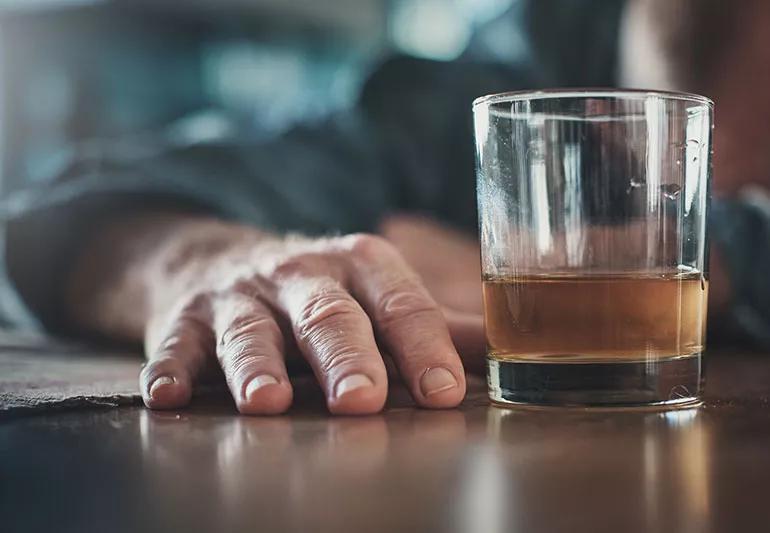An addiction specialist weighs in on the rising trend of “semi-sobriety”

Image content: This image is available to view online.
View image online (https://assets.clevelandclinic.org/transform/0a615b68-13d6-4847-9e57-495423003288/CaliforniaSober-1152590034770x533-1_jpg)
A close up of a person's hand and a half drunken glass containing an unknown, brown liquid
First, people started giving up wine for Dry January. Then gourmet mocktails were all the rage. One of the latest trends? California sober.
Advertisement
Cleveland Clinic is a non-profit academic medical center. Advertising on our site helps support our mission. We do not endorse non-Cleveland Clinic products or services. Policy
More and more people are experimenting with cutting out alcohol from their lives — or at least cutting back. The Cali sober approach is creating a buzz among celebrities and regular people alike.
Psychiatrist and addiction specialist Akhil Anand, MD, explains what California sober is all about, and whether it can help you reduce harm from intoxicating substances.
There’s no official definition for this approach to substance use. “The term is ambiguous and kind of a misnomer,” Dr. Anand says. “After all, you’re not sober if you’re still using mind-altering substances.”
Cali sober promotes cutting out certain addictive substances and replacing them with alternatives that, in theory, are less harmful.
Some people call themselves California sober because they use marijuana in place of alcohol and other addictive substances. Others define it as using alcohol and marijuana in moderation while avoiding other drugs.
If you have an uncomfortable or unhealthy relationship with alcohol or drugs, the California sober approach might sound tempting. But there are reasons to be cautious if you’re thinking of trading one vice for another.
“You’re replacing one addictive substance with another,” Dr. Anand notes. “It’s a slippery slope.”
Advertisement
Some marijuana fans claim the California sober approach helps them cut back on drinking. While that might work for some people, replacing alcohol with marijuana isn’t necessarily a safer choice, Dr. Anand says.
For one thing, the swap might not actually shut the door on drinking. “People who replace alcohol with marijuana are more likely to eventually start drinking again, compared to people who give up drinking and don’t use marijuana,” he says.
“And marijuana itself has negative consequences,” he adds. Marijuana can cause:
“And remember marijuana is still illegal on the federal level,” Dr. Anand says.
One potential pitfall of California sober is that everyone defines “moderation” differently. The National Institute on Alcohol Abuse and Alcoholism defines heavy drinking as consuming three to four drinks or more in a day.
Some people can enjoy an occasional cocktail. But for others, it’s all too easy to go overboard. “Some people aren’t able to drink moderately. For them, the consequences of drinking can be dire,” Dr. Anand says.
For many people who have an unhealthy relationship with alcohol, it’s more effective to cut it out completely instead of cutting back.
But if you’re interested in trying a Cali sober approach that includes some alcohol, Dr. Anand says it’s important to set clear goals and be honest with yourself. “If you want to drink less, be specific about how much daily alcohol use is acceptable,” he says. “If you can’t stick to those goals, you might need to seek out addiction support.”
If you’re toying with the idea of going California sober, it’s worth thinking about what your goals are. Dr. Anand suggests asking yourself some questions when thinking about how you use alcohol or drugs:
“If you answer ‘yes’ to any of these questions, that’s a red flag that you might need support,” Dr. Anand says.
Advertisement
For many people with a dependence on alcohol or drugs, California sober doesn’t go far enough.
“Substance use is complicated, and treatment should be tailored to the individual,” Dr. Anand says. “If you’re concerned about your use of alcohol or drugs, the best thing to do is seek support from your family, your doctor, a counselor or an addiction specialist.”
Advertisement

Sign up for our Health Essentials emails for expert guidance on nutrition, fitness, sleep, skin care and more.
Learn more about our editorial process.
Advertisement
It’s labeled as a supplement, but tianeptine is an addictive, dangerous drug
Xylazine is an animal sedative that’s behind an increasing number of human overdose deaths
You must act fast to save a life
The approach helps reduce the negative impact associated with substance use disorder
Drinking and drugs worsen mental health issues like depression and anxiety
Alcohol is a depressant and can interfere with your sleep, mood and more
Your tolerance decreases with age, thanks to body changes, health conditions and medications you may take
‘Blackout rage gallons’ can lead to dangerous levels of alcohol consumption
Although it could be used as a moisturizer, this new trend is not recommended
Communicating clear limits helps protect your time, energy and emotional well-being
High cholesterol can be genetic, but testing and treatment can lower your heart disease risk